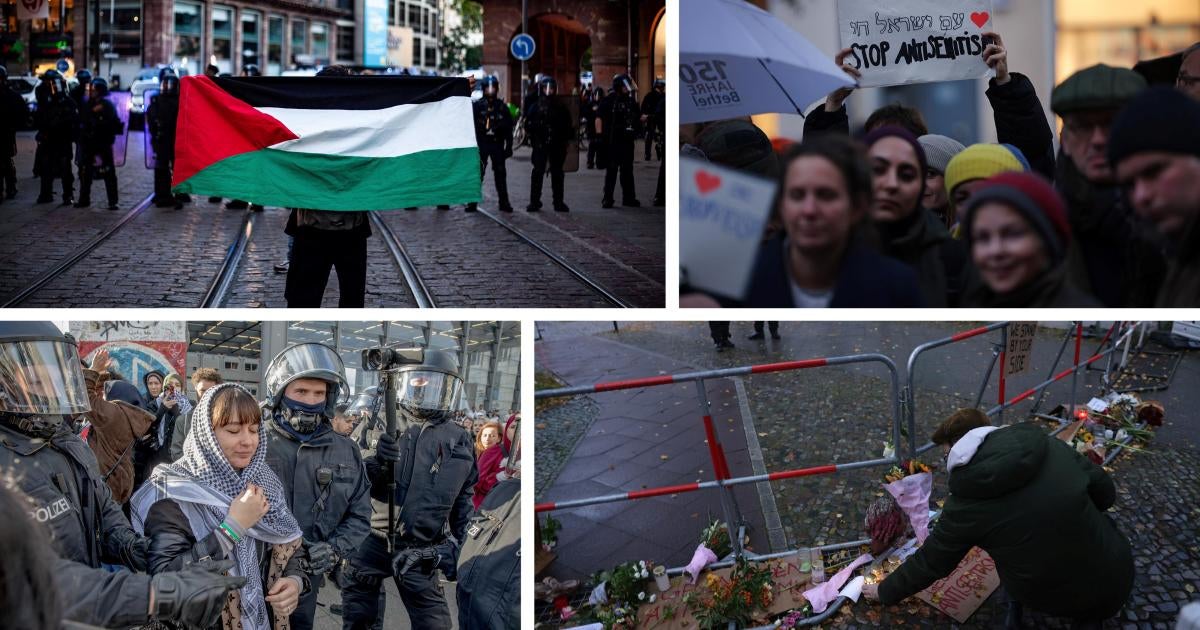(London, October 27, 2023) – Responses from European governments to the hostilities between Israel and Palestinian armed groups in Gaza are having harmful effects on human rights in Europe, Human Rights Watch said today. Concerns include inadequate responses to growing reports of antisemitism and Islamophobia; the use of immigration policies that risk discrimination against people perceived to be Arab, Palestinian, or Muslim; and bans and other restrictions on peaceful pro-Palestinian protest and expression.
“The authorities in European countries have a responsibility to make sure that everyone is safe and protected from violence and discrimination,” said Benjamin Ward, deputy Europe and Central Asia director at Human Rights Watch. “It’s also important for the authorities to protect people’s right to peaceful protest and expression and ensure that governments’ security responses to violence don’t harm rights.”
Several countries have reported an increase in antisemitic incidents since the start of hostilities on October 7, 2023. The Metropolitan Police in London, the United Kingdoms’ largest police force, recorded 218 antisemitic incidents in the first 18 days of October, compared with 15 during the same period in 2022. Community monitors in the UK received 600 such reports nationwide between October 7 and 23 compared with 81 in the same period in 2022.
In France, the interior minister said on October 24 there had been 588 antisemitic acts and 336 arrests linked to these acts since October 7. In Germany, a state-funded antisemitism research body recorded 202 antisemitic incidents between October 7 and 15 compared with 59 during the same week in 2022.
These statistics do not differentiate between physical attacks, threats, or hate speech directed at people and incidents targeting Jewish institutions or homes, such as an arson attack on a synagogue or daubing a Star of David on Jewish homes. However, they highlight the growing number of incidents since October 7 and raise concerns in Jewish communities about people’s safety.
Islamophobic hate crimes have also risen sharply in places that record such incidents. According to the Metropolitan Police, there were 101 Islamophobic offenses in London in the first 18 days of October, up from 42 during the same period in 2022. A community organization recorded 291 Islamophobic incidents in the UK from October 7 to 19, a sixfold increase from the same period in 2022.
Unfortunately, other countries have not published statistics on reported Islamophobic incidents since October 7, which suggests they do not record hate crimes against people perceived to be Muslim. Lack of data impedes effective policy responses to such hate crimes, Human Rights Watch said.
The authorities in various European countries have imposed excessive restrictions on pro-Palestine protest and speech since October 7.
French authorities imposed a blanket ban on pro-Palestinian protests, a move overturned by the Council of State, France’s highest administrative court, on October 18. Before the decision, 64 protests had been banned, media reported.
Berlin authorities have banned at least seven pro-Palestinian protests although several other pro-Palestinian protests were permitted. The protest bans prompted concern from the country’s antisemitism commissioner who noted that “demonstrating is a basic right.” On October 13, education authorities in the state of Berlin gave schools permission to ban students from wearing the Palestinian Keffiyeh black and white scarf and displaying “free Palestine” stickers, raising concerns about the right to free expression and possible discrimination.
Bans on pro-Palestinian protests have also been reported in the Austrian capital, Hungary, and parts of Switzerland.
Police in London have generally taken a nuanced approach to pro-Palestinian protest since October 7, including in relation to the use of slogans in protests that have been cited elsewhere in Europe to justify bans. This is despite political pressure on the police by the UK home secretary to use “the full force of the law” in the context of pro-Palestinian protests, and a statement by the UK foreign minister calling on pro-Palestinian supporters to stay at home. These statements, together with recent legislation restricting assembly, risk a chilling effect on the right to protest and free expression.
On October 13, a teacher was stabbed to death in a school in France. The authorities say the alleged killer, a former pupil, had pledged allegiance to the Islamic State prior to the attack. France’s interior minister has indicated he believes there is a link between the attack and events in Israel and Gaza, without specifying it. An attack in Belgium on October 16 that left two Swedish football fans dead appears not to be connected to the conflict.
France’s interior minister invoked the school stabbing to justify toughening an already controversial immigration bill, which was postponed last April, to make it easier to expel foreign nationals with suspected links to “radical ideology.” Germany’s interior minister has called for deporting people who express support for Hamas.
The UK immigration minister called for the revoking visas of people who spread “hate and division,” “incite antisemitism,” or support proscribed organizations, which in the UK and the European Union includes Hamas, and said this process has already begun. These policy approaches and the context of their introduction create a risk of discrimination against Muslim and Arab migrants and asylum seekers, Human Rights Watch said.
States have an obligation under human rights law to protect the right to life and security of everyone within their country without discrimination. That includes protecting people against antisemitic and Islamophobic hate violence. Governments should collect disaggregated data on race and ethnicity to allow them to respond more effectively to structural and other forms of racism and discrimination, Human Rights Watch said.
The authorities should ensure that they carry out policing and security functions without discrimination and protect everyone’s rights. But the need to counter violence based on hatred and to protect people should never be used to justify state discrimination or abusive immigration measures.
To protect the rights to freedom of assembly and expression, the authorities should avoid restrictions on protests unless they are absolutely necessary, and if imposed, should be strictly proportionate, based on a case-by-case assessment. Bans on protests should be a last resort. Criminalizing or banning general Palestinian symbols is a discriminatory and disproportionate response, constituting an unjustified interference with freedom of expression, Human Rights Watch said.
“The right to protest and to express criticism of governments is a cornerstone of a democratic society and an important way for people to hold their governments to account, including on foreign policy,” Ward said. “Banning peaceful protests deprives people of their fundamental democratic rights.”



